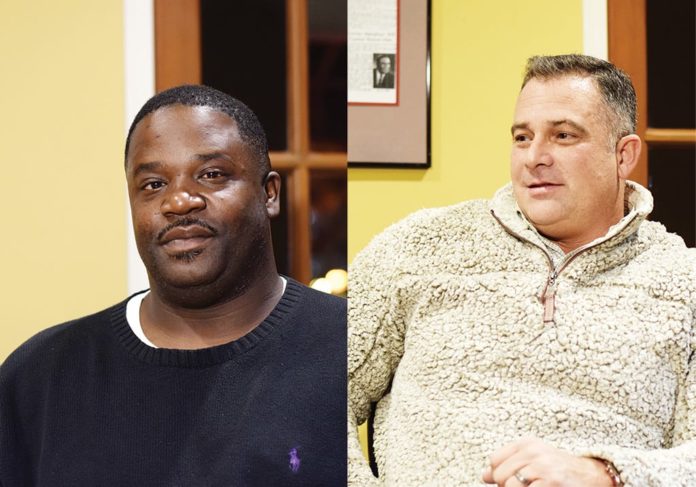This year marks Playback Memphis’ 10th anniversary of being about the business of fostering healing between the police and residents of this city amid a longstanding rift between law enforcement and black and brown people.
The problem scenario now is unfolding against the backdrop of a bitter political climate and under the microscopic, omnipresent eye of social media. So many people are afraid; so many cops are afraid. It’s a seemingly never-ending cycle of fear and loathing, not entirely unjustified.
But what happens when you strip the layers and dismantle the armor? What happens when you throw ex-offenders in a room with cops?
Playback happens.
Through a series of workshops and training, participants are stripped of these things, allowing each person to see the other’s humanity with nothing left but commonalities and compassion.
With the assistance of Playback, this week I had a very forthcoming conversation with a policeman – Officer Chris Street – and an ex-offender, Terric Edwards.
Street came to Playback upon the recommendation of his colonel, “voluntold” as he put it. Admittedly not into it initially, he came to realize that he had to get out of his comfort zone. He’d become jaded. Many police officers see the unimaginable on a regular basis and the effects linger after they clock out.
“People don’t call the police to say I’m having a great day. They call the police to say this is the worst day of my life in many cases,” Street said. “You’re constantly surrounded by the worst that society has to offer. It’s very easy to give up, to think that there is no hope for humanity or for Memphis.”
So, how to do you find the humanity after experiencing so much depravity?
“Playback offered something that I desperately needed. A place to let it out….be vulnerable and not worry that I’m being judged,” Street said. “I could share things that I couldn’t share with my car partner. For instance, you don’t share (with your partner) that the last call you were on haunted your sleep all night; or that you can still smell burning flesh.”
Such scenarios force people to face some hard truths and, in turn, unpack feelings of guilt. Street knew he had to change. Well, how does this turnaround come about?
Through the work with Playback, he came to see that racism takes many forms – there are levels to this. While he was sickened by blatant acts of racism, he came to see his own biases.
“I am no better or no different than anyone in this room.”
That room included Terric Edwards, with whom he seems to have developed a close relationship. A soft-spoken, mild-mannered father of four (also nine months sober), Edwards was slangin’ and bangin’ most of his adult life. As I listened to him, I heard how God clearly speaks to him and gives him direction.
He heard the voice while still in jail.
Edwards was nine when he witnessed police brutality for the first time. His mother called the police on his 26-year-old brother. The responding officer barnstormed into their home, yelling “get your s#$% and go.”
As his brother tried to explain, the officer rammed his head through a storm door that flew open from the force.
From that moment forward, Edwards wanted nothing to do with the cops. Yet he found himself in the streets for the sake of survival. He determined that was the best route to care for his younger brother and cousins once he lost his mom to drugs.
Caught on the wrong side of the law, he was sentenced to four years in prison. Re-entering society is a process. He couldn’t see going back to South Memphis. He settled upon Frayser. Then the Frayser-based Lifeline to Success option was put directly in his path.
“I always did things on my own. It was hard to look up to another man. But I had to come to realize that I can’t do this on my own.”
Though he turned up at Lifeline angry and bitter, he wanted to be legit, which included healing in unexpected ways.
Playback played a critical role in that healing. He was not trying to be in a room with a bunch of cops but, “Ms. Virginia (Murphy, Playback executive director) has the gift of connection” and he trusted his mentors at Lifeline.
He’d never considered the officers’ backstories, assuming they just “come out of the door pissed off at the world.” He never considered their feelings or well-being. To hear them voice their personal narratives was an eye opener. And he too had to confront feelings of guilt.
“My past is my past. I can’t feel guilty about it.”
Now, he simply commits to doing, and being, better.
When we know better, we do better; each one, reach one. When we take the time to actually see and hear each other, it makes our lives lighter, fuller, richer.
Playback Memphis is doing the difficult, very intentional work to push past deeply entrenched misgivings and tensions. I say they can count the first 10 years as a W and I am hopeful that the next 10 will bring bigger wins to our city.
(To learn more, visit www.playbackmemphis.org.)




